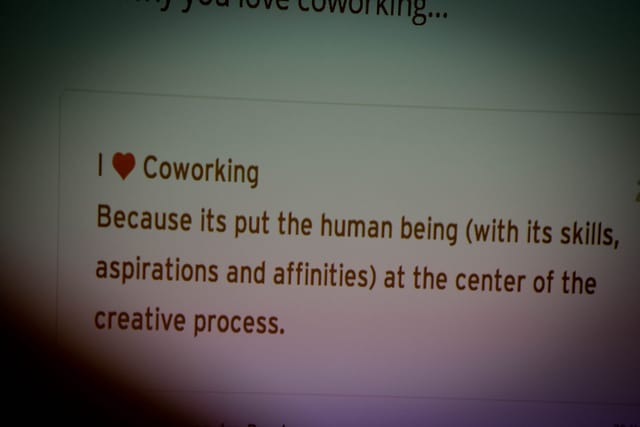Two Simple Productivity Tips.
In this post, I’ll share two things that have helped my productivity over the last few years, and they are NOT apps or gadgets.
Are you always wondering where your time goes?
Are you looking for an ‘edge’?
You can get helpful actionable direction like this in my ‘Sunday Scenario email‘ where I document my progress, triumphs and mistakes as a freelance consultant to the coworking industry.
It is super fun being a hands-on practitioner who is developing and working with everything I teach in workshops and uses with clients.
No theory here, the only action, which of course means a few cuts and bruises!
Back to our two productivity tips, they so are blazingly simple, so simple they might slip through your fingers and then you are back where you started.
If you have worked at either of these two below you will know the deep level of self-commitment you need to muster up to win, and when you start there is no stopping.
1. Stop That Shitty Self-Talk
First, stop beating yourself up. You must have read a pile of books where the topic of self-talk comes up.
The line is always something like, “would you talk to someone else the way you speak to yourself?“
Then there is the add on of, “what would you do if someone talked to your best friend the way you speak to yourself?”
For me, this falls into the ‘well, of course, I agree with that’, but it took me years to get it, and I am still working on it.
Back in my days of depression, most days had self-loathing on the agenda.
When I became aware of this, my self-talk and how it worked, I could see how I’d been operating in this way for years.
Talking crap to myself had become a habit; I was so skilled that it was on autopilot.
What a crappy skill to commit work on. All that time gone!
Now I did not start walking around saying beautiful things like ‘I’m a tiger’ to myself out loud.
But I did put a year’s worth of effort into nipping that crappy self-talk in the bud.
Own The Good Things You Do
Decide to own the good things you do.
Today two renowned industry experts gave me an in-person compliment.
Instead of downgrading myself with a joke, I said their acknowledgement means a lot.
They both are amazing people, and I’ve put a direct effort into the thing they complimented me on.
Jen Sincero’s book ‘You are a Badass‘ is a particularly entertaining way to get a grip on this aspect of life. I love her stuff!
This week check how many times you say a self-degrading throw-away comment.
Look out for things like ‘I’m so crap at that.’
Or ‘I don’t quite know what I am doing with this £2000 piece of equipment I brought to further my career.’
Yes, this is imposter syndrome.
We can go deeper into this another time; it is a favourite of mine in the Freelance Heroes group.
But I have zero time and energy for my imposter syndrome these days.
How do you know you have zero time, Bernie? Because I have RescueTime.
Where Did That Time Go?
Last week I clicked the button in my RescueTime app that tells me where I’ve spent time over the previous six years.
I track my ‘work time’ from 8 am – 6 pm Monday to Friday.
So the good news was I’ve spent two-thirds of my time on productive apps on my phone and computer.
But I have spent ONE THIRD on crap or ‘Total Distracting Time‘ as Rescue Time calls it.
Consider this the time I committed to working in, and instead, it became a ‘Total Distracting Time of 2,253h 57m
That’s three months, zero weeks, two days, 21 hours, 57 minutes, and 29 seconds.
If I billed that at a modest £85 an hour that means I’ve spunked £191,553.45
Ouch!
Which is the price of a brand new Lamborghini 4×4 SUV, if that’s how you like to impress your mates.

The Compound Effect and £191,553.45
How would you feel if you worked out you spent £191,553.45 worth of time on fucking Facebook and not being productive at all?
Don’t worry kids I’m ok; I’m rereading the Compound Effect book.
Darren, the author, points out not to get upset when you discover the compound effect working against you.
This insight gives you a stable place to work from; you can stop this dead and reverse it.
2. Know What Work You Are Going To Do
You can’t build a reputation on what you are going to do.
Henry Ford
The way most quotes get used on the internet makes me want to rip my knee caps off and use them as a blindfold.
In the ‘12 Week Year‘ book, every chapter starts with a quote.
I’ve listened to that book enough times the quotes are ingrained to my prefrontal cortex.
This one by Henry Ford hurts a lot. I do so love talking about what I’m going to do, and then not doing it.
So I stopped that.
Talking about what you are going to do is well-meaning hot air, fluff and no one cares, not even you.
Most of the time, it is a time-sucking attempt to convince ourselves of something.
Your actions speak louder than words, especially for yourself.
Building A Solid Process.
This process you read about every week has got me to see how much I don’t know what I’m going to do.
Example, I know I’m going to write, but I don’t know what I’m going to write in a work session.
Last week when I emailed you I knew I was going to write this to you this week.
So it has taken me 25 minutes to write this. It will need some editing in Grammarly and Hemingway Editor App, and then I’m good to go.
In the Make Your Mark 90 Day Challenge we have a workbook, so I’m planning all my content ahead of time.
It is not easy, but it is 100% worth the effort and saves time.
Of course, you can do this on your own, but working with a group of people skyrockets your productivity.
Write More By Knowing What You Are Going To Write
If you are a writer and need to pay attention to this type of thing, read 2k – 10K by Rachel Aaron.
In her book, Rachel documents how she had to change her work pattern after becoming a mother.
Rachel had four hours a day to sit down and write.
The four hours was the ONLY time she had so she had to work out ahead what that writing would be when she got in the chair.
By working this way, she rebuilt her ability to reach ten thousand words a day.
The Pain Of Change
January has been painful for me, but don’t cry for me, Argentina.
Paying detailed attention to the gaps in my delivery and workflow is helpful.
But change is painful and inconvenient; I’m such a sucker for short term reward.
I can fix things ‘on the fly’ because of my constant ‘learn and do, learn and do’ over the last decade.
An important chapter for you in the 12 Week Year‘ book is the one about the ‘Pain of Change and the valley of despair when it comes to goals.
It talks about ‘The Emotional Cycle of Change’ or said another way, it will go great, then go shit and you’ll want to give up.
But when you don’t give up you’ll get to the part where it all goes well and you get stronger and happier.
Most people quit when it gets a bit shit.
For example, as soon as I got to Lyon last week, I went for a 4.5-mile run before I even had a chance of not doing it.
It was cold, wet and in the end, exhilarating, and it was one more tiny compound effect act that kept me in the game.

